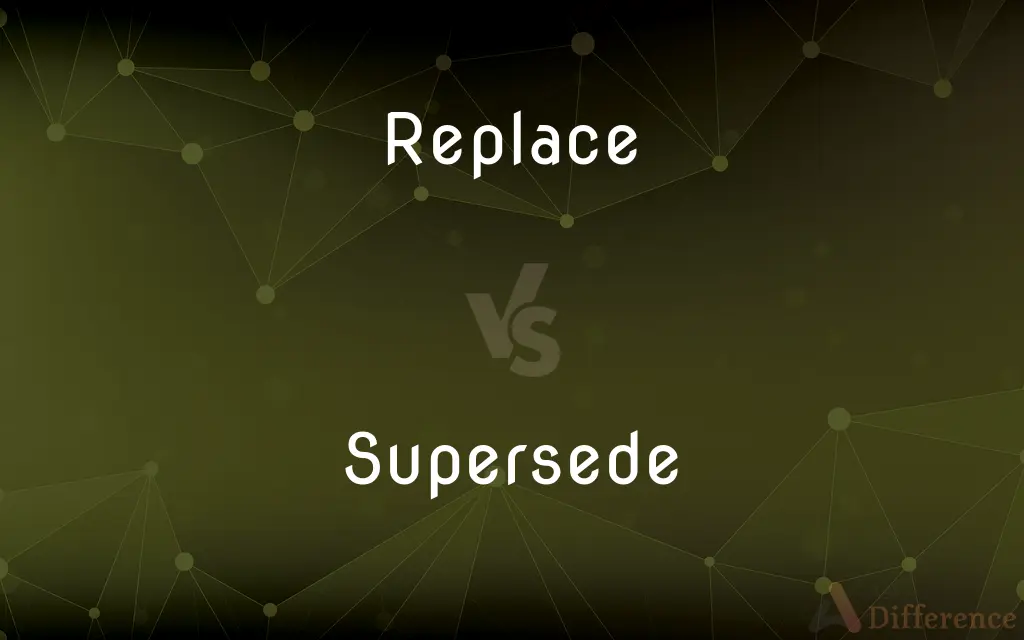Replace vs. Supersede — What's the Difference?
By Tayyaba Rehman & Urooj Arif — Updated on March 31, 2024
Replace involves taking the position of something else, while supersede implies an improvement or superiority over what it replaces.

Difference Between Replace and Supersede
Table of Contents
ADVERTISEMENT
Key Differences
Replace typically refers to the act of taking the place of something, often because the original is lost, broken, or outdated. It focuses on the physical or functional substitution of one thing for another. On the other hand, supersede suggests not just replacing but doing so with something that is considered an improvement or superior in some way. It often carries a connotation of progress or advancement.
While replacing can occur in various contexts, from everyday items to personnel in a job, superseding usually involves ideas, methods, technologies, or standards. For example, a new law can supersede an old one, indicating that it not only replaces the previous law but also provides a better or more relevant legal framework. This distinction highlights the different implications of the two terms; replacement can be routine or necessary for continuity, whereas supersession implies an upgrade or enhancement.
The decision to replace something may be driven by need or desire for a new version of a similar kind, whereas the decision to supersede is often motivated by the advantages the new item offers over the old. This can be seen in technology, where new models of devices replace older ones, but significant innovations or new technologies can supersede existing paradigms, offering new functionalities or efficiencies.
In practical terms, replacement often deals with like-for-like changes, where the new item serves the same function as the old in a similar manner. Superseding, however, involves adopting something that not only serves the original purpose but does so more effectively, or it introduces new capabilities that render the old way obsolete. For instance, digital streaming services have superseded physical media for many consumers, providing a more convenient and expansive way to access entertainment.
Both replacing and superseding are part of the process of change and innovation, but they highlight different aspects of this process. Replacing focuses on continuity and the maintenance of function, while superseding emphasizes improvement, efficiency, and the evolution of ideas and technology.
ADVERTISEMENT
Comparison Chart
Definition
To take the place of something else.
To take the place of something, often because it is superior.
Focus
Physical or functional substitution.
Improvement or superiority of the new over the old.
Context
Everyday items, personnel, methods.
Ideas, methods, technologies, standards.
Motivation
Need, desire for a new version of a similar kind.
Advantages the new item offers, progress.
Outcome
Like-for-like changes, continuity.
Enhanced efficiency, new capabilities, obsolescence of the old.
Compare with Definitions
Replace
The act of taking the position or role of something else.
The company plans to replace its old computer system with a more modern one.
Supersede
Implies improvement or advancement over what it replaces.
Streaming services have largely superseded DVD rentals, offering more convenience and selection.
Replace
Concerned with substituting one thing for another.
To reduce expenses, the manager decided to replace temporary workers with automated systems.
Supersede
Driven by the superiority or advancement of the new over the old.
Renewable energy sources are beginning to supersede fossil fuels due to environmental concerns.
Replace
Often done to maintain functionality or to update.
The museum replaced the old exhibit with a new one featuring recent archaeological finds.
Supersede
Involves adopting advancements that offer new functionalities or efficiencies.
Smartphones have superseded many standalone devices, such as cameras and GPS units, by incorporating their functionalities.
Replace
Involves selecting something similar or identical to fulfill the same role.
The software update replaced the old file management system with a more efficient one.
Supersede
To replace something, especially because it is superior.
The new tax laws will supersede the previous regulations, simplifying many processes.
Replace
Can apply to tangible objects, positions, or situations.
After breaking her phone, she replaced it with the same model.
Supersede
Often used with ideas, standards, technologies, or methods.
Digital signatures are superseding traditional ink signatures in many legal processes.
Replace
Take the place of
Ian's smile was replaced by a frown
Supersede
Take the place of (a person or thing previously in authority or use); supplant
The older models of car have now been superseded
Replace
Put (something) back in a previous place or position
He drained his glass and replaced it on the bar
Supersede
To take the place of; replace or supplant
"[Dean] Acheson's conversion, that military force should supersede diplomatic response as the core of U.S. foreign policy, would reverberate across generations" (James Carroll).
Replace
To put back into a former position or place
Replaced the sofa after vacuuming.
Supersede
To take the place of (a person), as in an office or position; succeed.
Replace
To restore or return
Replaced the money he had stolen.
Supersede
(transitive) To take the place of.
Those older products have been superseded by our new range.
Replace
To take the place of
Jets have largely replaced propeller planes. Nurse practitioners are replacing doctors in some clinics.
Supersede
(transitive) To displace in favour of itself.
Modern US culture has superseded the native forms.
Replace
To fill the place of; provide a substitute for
Replaced the team's coach.
Replaced the wall-to-wall carpeting with hardwood floors. See Usage Note at substitute.
Supersede
(Internet) An updated newsgroup post that supersedes an earlier version.
Rogue cancels and supersedes are being issued on a large scale against posters.
Replace
(transitive) To restore to a former place, position, condition, etc.; to put back
When you've finished using the telephone, please replace the handset.
Supersede
To come, or be placed, in the room of; to replace.
Replace
(transitive) To refund; to repay; to pay back
You can take what you need from the petty cash, but you must replace it tomorrow morning.
Supersede
To displace, or set aside, and put another in place of; as, to supersede an officer.
Replace
(transitive) To supply or substitute an equivalent for
I replaced my car with a newer model.
The batteries were dead so I replaced them
Supersede
To make void, inefficacious, or useless, by superior power, or by coming in the place of; to set aside; to render unnecessary; to suspend; to stay.
Nothing is supposed that can supersede the known laws of natural motion.
Replace
(transitive) To take over the position or role from.
Supersede
To omit; to forbear.
Replace
(transitive) To take the place of; to be used instead of
This security pass replaces the one you were given earlier.
Supersede
Take the place or move into the position of;
Smith replaced Miller as CEO after Miller left
The computer has supplanted the slide rule
Mary replaced Susan as the team's captain and the highest-ranked player in the school
Replace
(transitive) To demolish (a building) and build an updated form of that building in its place.
Replace
To place again.
Replace
To put in a new or different place.
Replace
To place again; to restore to a former place, position, condition, or the like.
The earl . . . was replaced in his government.
Replace
To refund; to repay; to restore; as, to replace a sum of money borrowed.
Replace
To supply or substitute an equivalent for; as, to replace a lost document.
With Israel, religion replaced morality.
Replace
To take the place of; to supply the want of; to fulfull the end or office of.
This duty of right intention does not replace or supersede the duty of consideration.
Replace
To put in a new or different place.
Replace
Substitute a person or thing for (another that is broken or inefficient or lost or no longer working or yielding what is expected);
He replaced the old razor blade
We need to replace the secretary that left a month ago
The insurance will replace the lost income
This antique vase can never be replaced
Replace
Take the place or move into the position of;
Smith replaced Miller as CEO after Miller left
The computer has supplanted the slide rule
Mary replaced Susan as the team's captain and the highest-ranked player in the school
Replace
Put in the place of another; switch seemingly equivalent items;
The con artist replaced the original with a fake Rembrandt
Substitute regular milk with fat-free milk
Replace
Put something back where it belongs;
Replace the book on the shelf after you have finished reading it
Please put the clean dishes back in the cabinet when you have washed them
Common Curiosities
What does it mean to replace something?
To replace something means to take its place or position with something else, often due to the original being lost, outdated, or broken.
Can a policy supersede another?
Yes, a new policy can supersede an older one, indicating that it not only replaces but also offers a better approach or solution.
What does supersede mean?
To supersede means to take the place of something, especially because the new item is an improvement or superior to what it replaces.
How do companies decide whether to replace or supersede a product?
Companies consider factors like technological advancements, customer needs, and market trends to decide whether to replace a product with a similar one or supersede it with a superior option.
Can environmental considerations lead to superseding decisions?
Yes, environmental considerations, such as the need for sustainability, can drive the decision to supersede older practices with greener alternatives.
Can a new employee supersede an existing one?
A new employee can supersede an existing one if they bring superior skills or efficiency to the role, beyond just replacing them.
How does the concept of superseding apply in legal contexts?
In legal contexts, a more recent statute or ruling can supersede older ones, reflecting changes in law, society, or technology.
Can a new law supersede a constitutional amendment?
A new law cannot supersede a constitutional amendment; amendments require a more rigorous process reflecting their foundational superiority.
Is upgrading a device considered replacing or superseding?
Upgrading a device is often considered replacing if it's a similar model, but it can be seen as superseding if the new device offers significant improvements or new features.
Is obsolescence always a result of superseding?
Obsolescence often results from superseding, as new improvements render old methods or products less useful or relevant.
What is an example of technology superseding another?
The transition from landline telephones to mobile phones is an example of technology superseding, as mobile phones offer greater functionality and convenience.
How do social norms influence what is superseded?
Social norms and cultural shifts can influence what is superseded, as societal values change over time, affecting preferences and practices.
Can replacing something always lead to improvement?
Replacing something does not always lead to improvement; it often maintains the status quo, whereas superseding aims for enhancement.
Do digital books replace or supersede physical books?
Digital books may replace physical books for convenience, but whether they supersede them can be subjective, depending on personal preferences for reading.
Share Your Discovery

Previous Comparison
Palm vs. Hand
Next Comparison
Deposit vs. WithdrawalAuthor Spotlight
Written by
Tayyaba RehmanTayyaba Rehman is a distinguished writer, currently serving as a primary contributor to askdifference.com. As a researcher in semantics and etymology, Tayyaba's passion for the complexity of languages and their distinctions has found a perfect home on the platform. Tayyaba delves into the intricacies of language, distinguishing between commonly confused words and phrases, thereby providing clarity for readers worldwide.
Co-written by
Urooj ArifUrooj is a skilled content writer at Ask Difference, known for her exceptional ability to simplify complex topics into engaging and informative content. With a passion for research and a flair for clear, concise writing, she consistently delivers articles that resonate with our diverse audience.














































